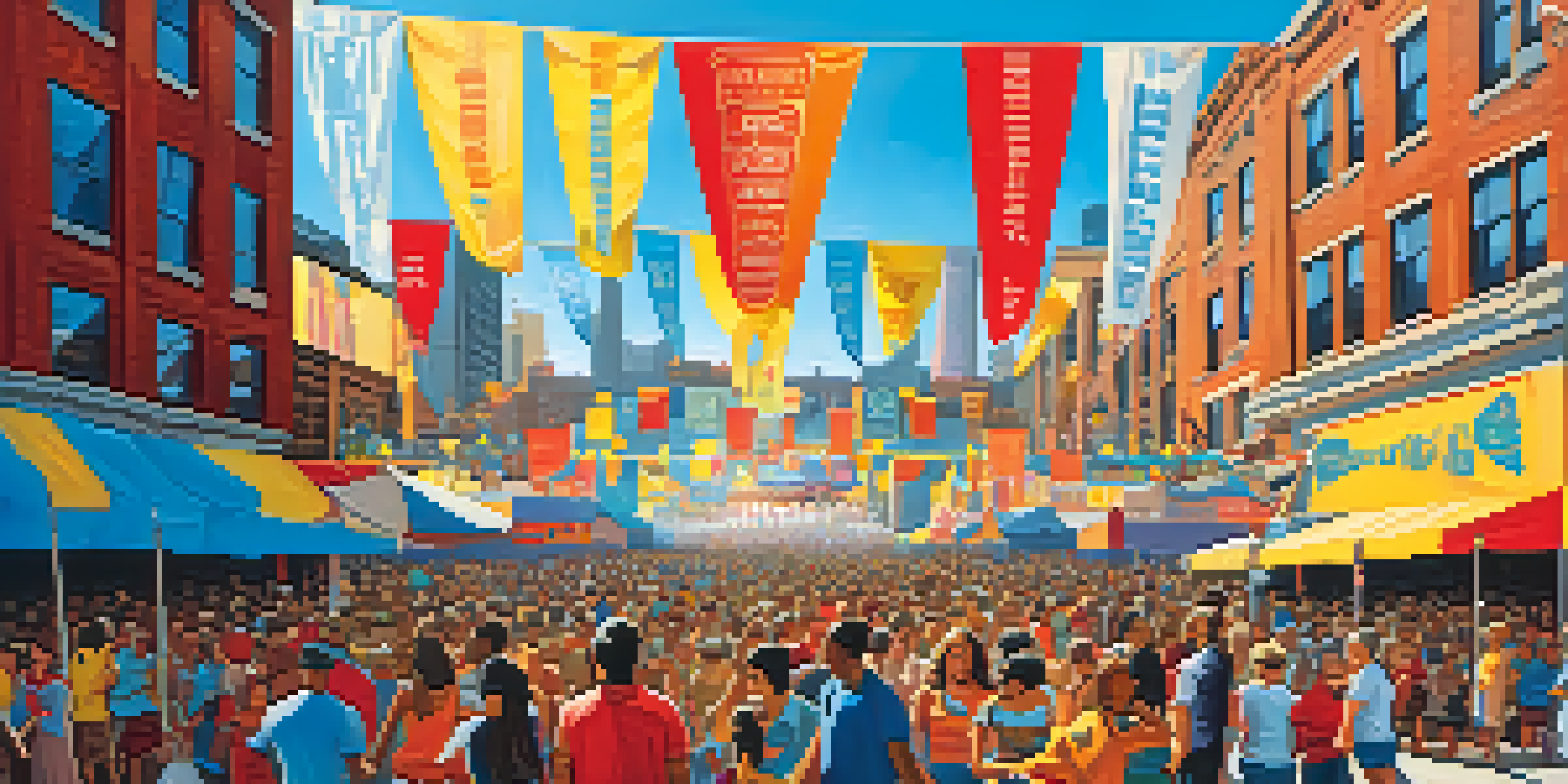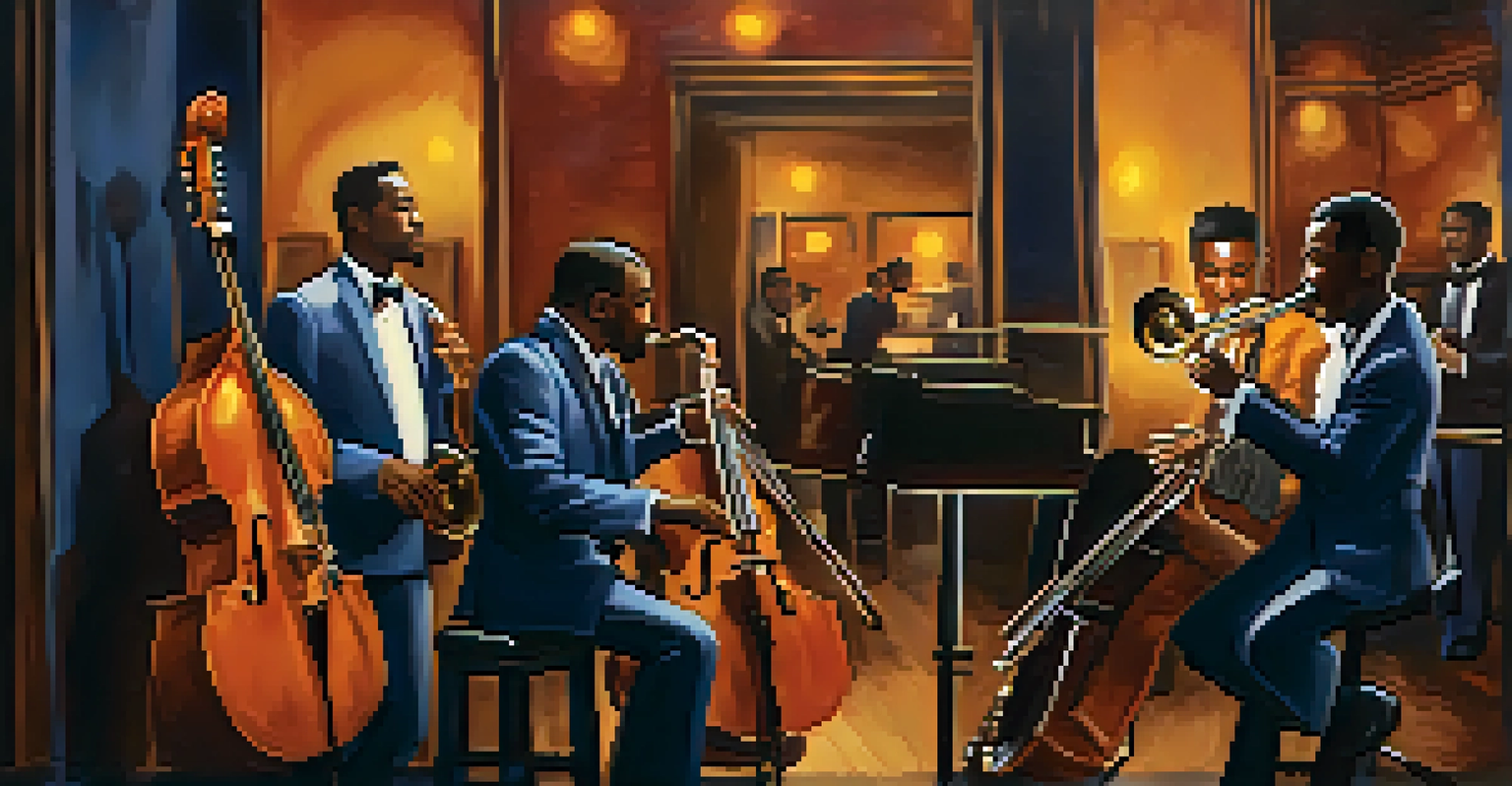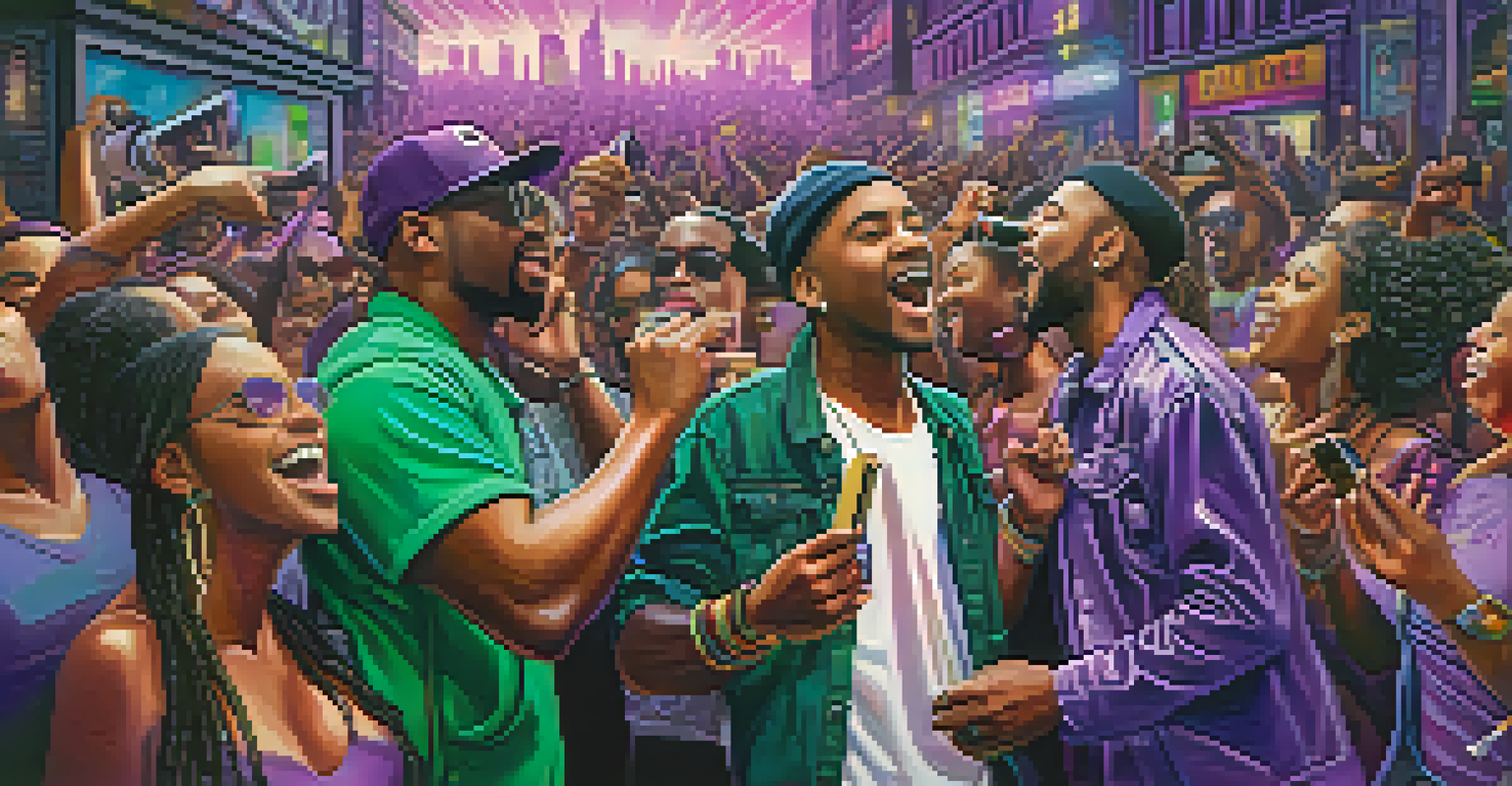Detroit's Music Scene: A Melting Pot of Genres and Styles

A Brief History of Detroit's Musical Legacy
Detroit's music scene has roots that stretch back to the early 20th century, with jazz and blues artists making a significant impact. Legends like Ella Fitzgerald and John Lee Hooker graced its stages, laying the groundwork for future genres. Over time, the city became synonymous with Motown, a sound that brought Detroit international acclaim and forever changed the music industry.
Music is the shorthand of emotion.
The Motown era introduced iconic artists like Marvin Gaye and The Supremes, and their influence can still be felt today. Motown wasn't just a label; it was a cultural phenomenon that united people through the power of music. This blend of rhythm and soul created a unique sound that resonated across generations.
As the decades passed, Detroit continued to evolve musically, giving rise to punk rock, techno, and hip-hop. Each genre contributed to the city’s rich tapestry, showcasing its role as a breeding ground for innovative sounds. Today, Detroit stands as a testament to the transformative power of music, fostering creativity and collaboration.
The Impact of Motown on Modern Music
Motown's influence extends far beyond its era, shaping countless artists and genres that followed. The label's formula of catchy melodies combined with heartfelt lyrics set a standard for pop music that persists today. Contemporary artists often cite Motown legends as inspirations, illustrating the lasting legacy of this Detroit-based powerhouse.

The signature 'Motown sound' characterized by its use of tambourines, horns, and layered vocals has been widely imitated. It's a style that not only defined a genre but also influenced pop, R&B, and even hip-hop. Today, you can hear echoes of this sound in the work of artists like Bruno Mars and Lizzo, who carry the torch of Motown's innovative spirit.
Detroit's Diverse Musical Legacy
Detroit has a rich musical heritage that spans jazz, blues, Motown, punk, techno, and hip-hop, showcasing its role as a breeding ground for innovative sounds.
Moreover, the success of Motown laid the groundwork for other genres to flourish in Detroit, creating a diverse musical landscape. This cross-pollination of styles has allowed artists to experiment and blend different influences, making the music scene richer and more vibrant. The city's ability to innovate while honoring its roots is a key part of what makes Detroit's music so compelling.
Techno: Detroit's Electronic Revolution
In the 1980s, Detroit emerged as the birthplace of techno music, a genre that has since gained global recognition. Pioneers like Juan Atkins, Derrick May, and Kevin Saunderson melded electronic sounds with influences from funk and soul, creating a revolutionary sound that was distinctly their own. This new genre transformed the landscape of music, resonating with fans around the world.
Without music, life would be a mistake.
Techno music reflects the industrial backdrop of Detroit, with its pulsating beats and synthetic sounds mirroring the city's gritty urban environment. The genre speaks to the city's resilience and innovation, making it a powerful form of artistic expression. Techno has since evolved, spawning various sub-genres and influencing a wide range of artists and styles.
Today, Detroit techno is celebrated through festivals like Movement, which attracts thousands of fans each year. These events not only showcase local talent but also highlight the city's ongoing contribution to the global music scene. The dedication of Detroit's techno community continues to inspire new generations of musicians, ensuring the genre remains alive and thriving.
The Punk Rock Scene: Defiance and Creativity
Detroit's punk rock scene burst onto the scene in the late 1970s, fueled by a sense of rebellion and a DIY ethos. Bands like The Stooges and MC5 challenged the status quo with their raw sound and electrifying performances. This movement was not just about music; it was a statement against societal norms, giving voice to the disenchanted youth of the era.
The gritty ambiance of Detroit provided the perfect backdrop for this burgeoning scene, where underground venues became sanctuaries for self-expression. Punk rockers embraced a spirit of collaboration, often supporting one another through shared shows and collective struggles. This sense of community helped to solidify Detroit as a punk rock hub, attracting like-minded individuals from across the region.
Motown's Lasting Influence
The Motown sound set a standard for pop music and continues to inspire contemporary artists, demonstrating its profound impact on the music industry.
Over the years, Detroit's punk scene has continued to evolve, giving rise to new bands and genres, from pop-punk to hardcore. Today, the legacy of those early punk pioneers can be seen in the music of contemporary artists who draw inspiration from their defiant spirit. The city's punk rock history remains a vital part of its cultural identity, celebrating the power of music as a form of protest.
Hip-Hop: A Voice for Change and Identity
Detroit's hip-hop scene has emerged as a powerful voice for change, reflecting the city's struggles and triumphs. Artists like Eminem and Big Sean have brought national attention to Detroit’s vibrant culture, using their platforms to tell stories of resilience and hope. Hip-hop in Detroit is not just about beats and rhymes; it's a narrative that speaks to the heart of the community.
The genre has deep roots in Detroit, influenced by the city's rich musical heritage, including Motown and funk. Local rappers often incorporate elements from these styles, creating a unique sound that resonates with fans. This blending of genres showcases the city's ability to innovate while honoring its past, making Detroit a melting pot of musical expression.
Moreover, Detroit's hip-hop scene has fostered a sense of community, with artists collaborating and supporting one another. Events like the Detroit Music Awards celebrate local talent, highlighting the diversity and creativity within the scene. As hip-hop continues to grow and evolve, Detroit remains at the forefront, using music as a means of empowerment and change.
Jazz and Blues: The Heart of Detroit's Music
Jazz and blues have long been integral to Detroit's musical identity, with their roots embedded in the city's history. Legendary figures like Miles Davis and Aretha Franklin have called Detroit home, contributing to a rich musical legacy that continues to inspire new artists. This genre's improvisational nature mirrors the city's vibrant spirit, allowing musicians to express their emotions freely.
The jazz clubs of Detroit have served as incubators for talent, where aspiring artists hone their craft and develop their unique styles. Venues like the Blue Loon and the Detroit Jazz Festival provide spaces for musicians to connect with audiences, fostering a sense of community. The city's commitment to preserving its jazz and blues heritage ensures that these genres remain alive and well.
Music Festivals Unite the Community
Music festivals in Detroit celebrate the city's diverse genres, fostering a sense of unity and collaboration among artists and fans while boosting the local economy.
In recent years, there has been a resurgence of interest in jazz and blues, with new artists emerging to carry on the tradition. This revival showcases the versatility of the genres, as musicians experiment with fusion and contemporary influences. Detroit's jazz and blues scene is a testament to the city's enduring love for music, celebrating its past while looking toward the future.
The Role of Music Festivals in Detroit's Scene
Music festivals play a crucial role in showcasing Detroit's diverse musical landscape, bringing together artists from various genres and backgrounds. Events like the Detroit Jazz Festival and Movement attract thousands of visitors each year, celebrating the city's rich musical heritage. These festivals not only highlight local talent but also promote cultural exchange and collaboration.
Festivals provide a platform for emerging artists to gain exposure and connect with fans, creating opportunities for growth within the music community. They foster a sense of unity among musicians and fans alike, emphasizing the importance of music as a shared experience. This communal atmosphere enhances the vibrancy of Detroit's music scene, making it a welcoming space for all.

Additionally, music festivals contribute to the local economy, attracting tourism and encouraging support for local businesses. The ripple effect of these events helps to sustain the city's creative ecosystem, ensuring that Detroit remains a thriving hub for musical innovation. As the city continues to evolve, its festivals will play an essential role in shaping the future of Detroit's music scene.